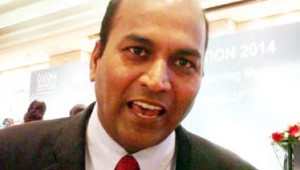Martyn Newman is the author of Emotional Capitalists: The New Leaders.This book is almost like an updated version of Daniel Goleman’s path-breaking Emotional Intelligence. Dr. Newman is an emotional intelligence psychologist and a visiting fellow at Sheffield Business School, a part of Sheffield Hallam University, UK. Martyn advises organizations grappling with major challenges of managing the new breed of workforce. In a chat with Benedict Paramanand, he talks of the emergence of the new-age leader and the new-age employee whose common binding thread is emotional capitalism.
Martyn Newman is the author of Emotional Capitalists: The New Leaders.This book is almost like an updated version of Daniel Goleman’s path-breaking Emotional Intelligence. Dr. Newman is an emotional intelligence psychologist and a visiting fellow at Sheffield Business School, a part of Sheffield Hallam University, UK. Martyn advises organizations grappling with major challenges of managing the new breed of workforce. In a chat with Benedict Paramanand, he talks of the emergence of the new-age leader and the new-age employee whose common binding thread is emotional capitalism.
Psychology and management – how are they working together?
In terms of context of emotional intelligence and its relevancy,we have observed that Indian leadership and Indian management have come to recognize emotional intelligence as a viable and valuable concept. To a large extent that doesn’t surprise me. As I have experienced the Indian culture overtime I have found it to be a values-based culture, a culture with a strong heritage.
Therefore if you take one of the fundamental competencies in the emotional capital model, empathy is a core idea. In a culture such as India, or many Asian cultures, there is a great deal of focus on living with compassion towards people.
What’s your view on the India way of management?
I have spoken to groups in Delhi, Mumbai and Bangalore. I see a movement to return to the root meaning of company – a collection of people. People bring to work a set of personal values; they need to understand clearly how those fit with the organizational values in which they are now required to spend so much of time. I think that the gap between ‘what I value and what this organization values’leads to low morale andgroup resistance. Organizations have to understand that it is important to be explicit about their values and they need to close the gap between their values and people’s values.
People today want to work for more than just a paycheck. They want to work for organizations that have more than just a product – they want to believe that their work has value, to believe that there is meaning and purpose it what they do. When this becomes a reality, it engages the workforce at a profound level. It engages their commitment. I think the Indian culture is returning to its core set of values. That’s why emotional intelligence resonates quite profoundly here within leadership.
What Indian leaders need from people like you, is to put a framework to it. It’s one thing to have it in your subconscious and another thing to apply it….
I think this is where the behavioral sciences have been very helpful to us. You can have a value such as compassion – but what does it look like as a behavior that I can recognize? Psychology wants to talk about empathy and then it wants to distill it, then state what behaviors constitute empathy so that these behaviors be measured and learnt. Psychology as a science of human behaviour wants to know can these behaviours be replicated so that we can produce empathic behaviour?
The people who are coming into the work force today are better informed than the previous generation, better educated, better connected, but more importantly, they care about different things. In their roles as customers and employees they expect more from businesses. For them the brand is more than just superficial recognition of a logo; the brand conveys a promise, and it conveys what this business stands for. In my language, it’s an emotional contract with a customer and an employee. It says that by dealing with us this is the contribution that we are all making. I think people care a lot more today about how money is made than the previous generation.
People want to work for organizations they feel proud of. They want to feel that they have a passion and a mission. This is a new form of emergent capitalism that I call Emotional Capital because customers, employees and suppliers want the business to deliver a new kind of value that’s more than just a product.
Leaders are like psychologists
Leadership is a little bit like being a psychologist. I have often asked what I love about being a psychologist and I have come to the conclusion that ultimately when people sit in the clinic and their lives are stuck, what they want to talk about is how can they create a future that is full of hope. I am convinced leaders have a similar role. They have to describe the future to their people and what it looks like. It’s a story they need to tell, a dream or destiny story, and that passion ignites in people another level of productivity and commitment. It’s the fire and energy that makes talent dance inside an organization. They are really there to light a fire across businesses and ignite the energy of young people who want to make a contribution.
Daniel Goldman’s book introduced the world to Emotional Intelligence (EI). Dan made some very strong claims in that book about the links between emotional intelligence and performance. At that stage there wasn’t a great deal of data to support those claims. Now we have examined those claims forensically for ten years. If you look at the literature that’s been published, if you examine the relationship between EI and leadership you will find at least 141 rigorous pieces published in peer reviewed journals that have made the connection quite strongly between EI and leadership performance.
We examined that literature to find what the common elements were. We were able to have a close look at those skills, to see what those skills had in common then polish them and focus them sharply around business performance. This is the Emotional Capital model of Emotional intelligence and leadership.
New Work Realities
If people are not coming together in geographical locations as much as they once were, people are going to need to move from being outer directed to being inner directed. Here we have to trust people;to set them free.
Geographically where you are is no longer important, its technology now that keeps us connected, so the onus on you is going to be to find inside yourself the motivation. Therefore thee emotional skills become absolutely critical. People work well for leaders if they feel those leaders appreciate their contribution; they work well if they like those leaders and they like the leaders in direct proportion to how they make them feel. Now, leaders who know how to engage the emotional drivers of behavior create around them a group of people who are inner directed, who are responsible and self-motivated.
There are only two ways to change behavior, you can either manipulate it or you can inspire it. Leaders who are still intent on taking a sticks and carrots approach to try to manipulate behavior will no longer be affective in the current work environment.
The new employees too need to adapt to the new normal. Asking leaders how you willmotivate me is a wrong question to ask. You have to motivate yourself; you don’t give up and look to other people to motivate you; ultimately you have to make a decision as to what your values are, your objectives and your goals.
Soon, it will be about people who either pick up the pen and author their own story, or find leaders who are exceptional, who give them a pen and say – write a paragraph in the life of this business and I will back you up. And to do that you have to invest authority and autonomy in the workforce and that is a radical shift. The skills you need to do this are emotionally based. We now know how to define them and measure them and can calculate the impact on the bottom line. I call this emotional capital and leaders who know the value of leading with these skills Emotional Capitalists.











Recent Comments